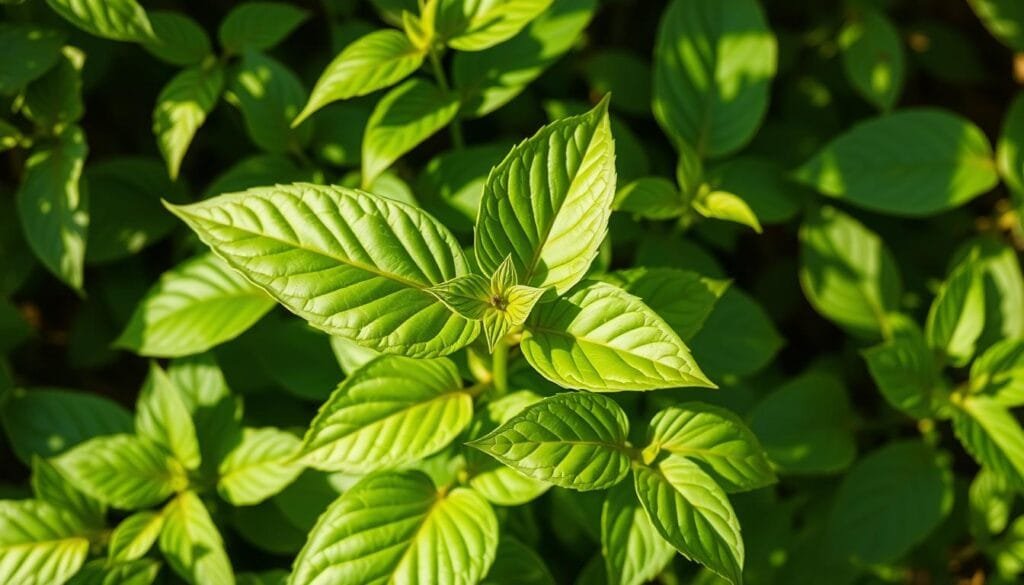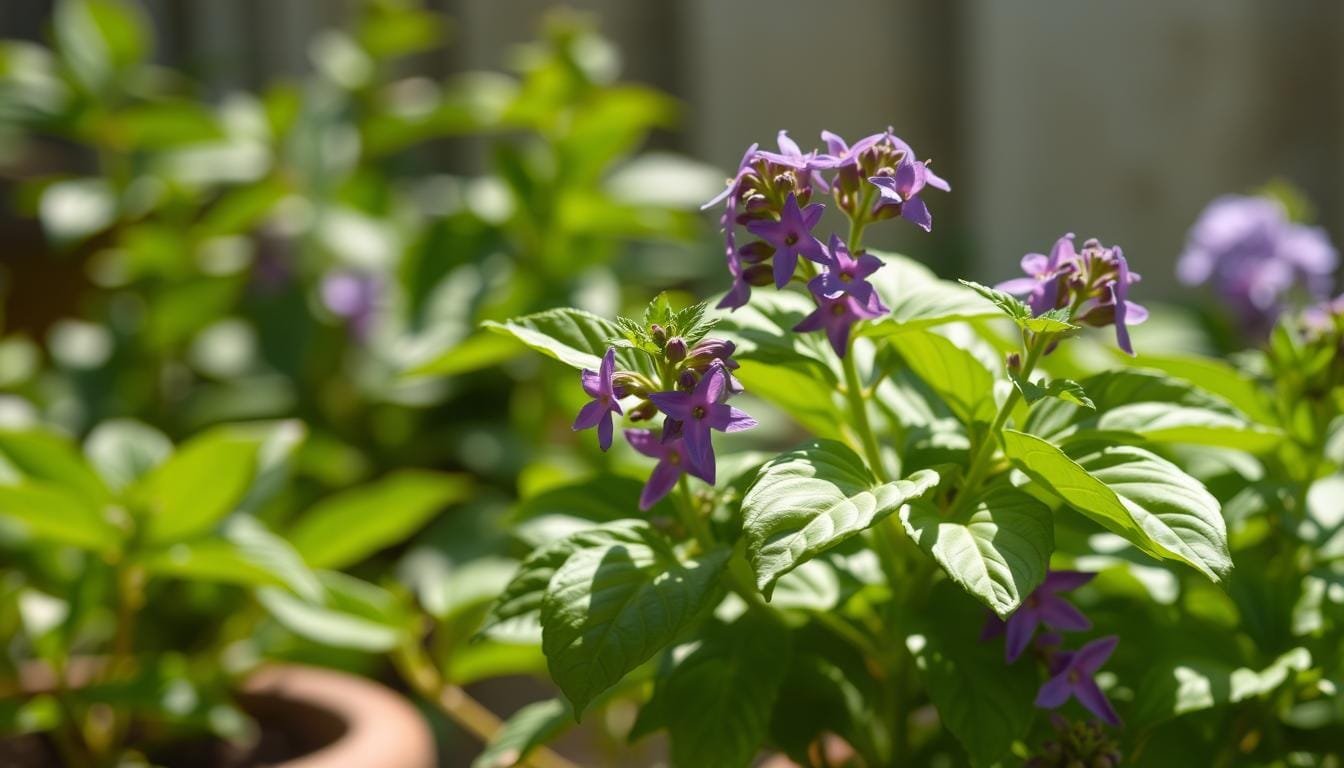I love learning about health, and holy basil is really interesting. It’s also known as Tulsi or Ocimum sanctum. This herb comes from Southeast Asia and is very important in Ayurvedic medicine. It helps the body deal with stress and stay balanced.
Studies have shown holy basil is great for many health issues. It can help with stress, manage blood sugar, boost the immune system, and even support heart health. In this article, we’ll look at 10 ways holy basil can improve your health.
Understanding Holy Basil: The Sacred Herb of Ancient Medicine
Holy basil, also known as Tulsi, is a plant from the Lamiaceae family. It’s deeply rooted in Ayurvedic and Siddha medicine for thousands of years. This sacred herb, native to the Indian subcontinent, treats many health issues, from eye diseases to skin infections.
Origin and Traditional Uses in Ayurvedic Medicine
Tulsi, scientifically named Ocimum sanctum, grows mainly in Southeast Asia. India is a key place for its cultivation. In Ayurvedic medicine, it’s a highly valued herb. It’s used in religious and cultural practices like worship, weddings, and funerals.
Active Compounds and Nutritional Profile
Holy basil is packed with bioactive compounds like eugenol and ursolic acid. These compounds give the herb its healing properties, including antioxidants and anti-inflammatory effects. It’s also a nutritional powerhouse, providing vitamins A and C, calcium, iron, and zinc.
| Compound | Benefit |
|---|---|
| Eugenol | Antioxidant, anti-inflammatory, analgesic |
| Ursolic acid | Anti-cancer, anti-diabetic, anti-inflammatory |
| Beta-caryophyllene | Anti-inflammatory, analgesic, anti-anxiety |
“Tulsi is considered the most sacred plant on earth in Vedic Puranas and holds significance in Indian cultural practices like worship, weddings, and funerals.”
Benefits of Holy Basil: Scientific Evidence and Research
Recent studies have confirmed the traditional uses of holy basil, also known as Tulsi. A 2017 review of 24 clinical trials with 1,111 participants found several benefits. These included no serious side effects.
The research shows promise in areas like metabolic conditions, mood disorders, and immune function. Yet, many studies were small and short-term. This highlights the need for bigger, better trials to confirm these findings.
Some key findings from the scientific literature on holy basil include:
- Potential benefits for metabolic conditions, including better blood sugar control and heart health.
- Possible anti-inflammatory effects that may improve lung function and asthma symptoms.
- Potential to boost the immune system, fighting off viral infections.
- Small studies suggest it may enhance attention, memory, and sleep quality.
The ways holy basil works are not fully understood. Some research points to its impact on the GABA pathways in the body. While it’s generally safe, it might cause nausea, diarrhea, or interact with some medications in some people.
“The reviewed studies reported favorable clinical outcomes with no significant adverse events.”
The scientific evidence on holy basil is encouraging. Yet, more extensive, high-quality clinical trials are essential. They will help fully understand its benefits and ensure safe, effective use for various health conditions.
Natural Stress Relief and Mental Wellness Support
Holy basil, also known as Tulsi, is an adaptogen. It helps the body adapt to stress, like chemical, physical, infectious, and emotional stress. Studies show it can lower stress levels, boost endurance, and speed up metabolism under stress.
How Holy Basil Acts as an Adaptogen
Holy basil affects the body’s cortisol levels and GABA pathways in the brain. This helps regulate stress response. It lets the body handle and recover from stress better.
Impact on Anxiety and Depression
Research on holy basil’s effects on anxiety and depression is ongoing. Some studies suggest it can improve mood and reduce anxiety. But, more research is needed to fully grasp its mental health benefits. Yet, the evidence is encouraging, showing holy basil could be a natural stress and mood booster.
“One study found that supplementing with holy basil for two months reduced symptoms of generalized anxiety disorders.”
For those looking for natural stress relief and mental wellness, holy basil is worth exploring. It could be a valuable tool in your wellness journey.

Blood Sugar Management and Metabolic Health
Holy basil, a sacred herb in Ayurvedic medicine, helps manage blood sugar and supports metabolic health. Studies show it can be a valuable addition to your wellness routine. It helps keep glucose levels healthy and improves insulin sensitivity.
A 2017 review of 24 studies found holy basil is safe and may help regulate blood sugar and cholesterol. Another study with 100 participants showed taking 5 milliliters of holy basil extract daily for three months improved metabolic syndrome markers. These included blood glucose, blood pressure, and lipid profiles.
Holy basil’s effects on blood sugar are thought to come from improving insulin sensitivity and helping cells take in glucose. A pilot study with 30 overweight and obese young adults found holy basil reduced insulin resistance and cholesterol levels. This shows its benefits for metabolism.
For those with prediabetes or type 2 diabetes, holy basil could be helpful. Studies suggest it can help keep blood sugar levels normal. But, always talk to your healthcare provider before adding holy basil, as it might affect diabetes medications.
Holy basil also helps keep cholesterol levels healthy and blood pressure normal. Its adaptogenic properties help the body handle stress, anxiety, and fatigue. This supports overall metabolic wellness.
You can enjoy holy basil in teas, extracts, or supplements. It offers a natural way to manage blood sugar and metabolic health. Always follow the recommended dosage and consult your healthcare provider, even more so if you have health conditions.
Boosting Immune System Function
Holy basil, a sacred herb in Ayurvedic medicine, boosts the body’s defense. It increases immune cells and cytokines, helping fight off colds and flu. This makes it a powerful ally for our immune system.
Antiviral and Antibacterial Properties
Holy basil fights viruses and bacteria well. Its antioxidants, like flavonoids and polyphenols, stop harmful microbes. This helps protect us from infections.
Inflammation Response Enhancement
Holy basil also reduces inflammation. Its antioxidants, like eugenol and linalool, fight chronic inflammation. This supports a strong immune system.
Adding holy basil to your diet can boost your immune system. You can use fresh leaves, supplements, or pesto. Always talk to your doctor before trying new supplements.

“A clinical study of healthy volunteers taking Holy Basil extract showed a significant increase in levels of key markers of healthy immune function.”
Heart Health and Cholesterol Management
Holy basil, also known as tulsi, is more than just a stress reliever. It also supports heart health and helps manage cholesterol levels. This ancient Ayurvedic herb has shown promise in these areas.
Research indicates that holy basil can lower LDL (bad) cholesterol. This is a major risk factor for heart disease. Its antioxidants reduce oxidative stress and inflammation, which helps prevent artery plaque buildup. Drinking holy basil tea or taking supplements can improve your lipid profile, boosting HDL (good) cholesterol.
A 2018 study found that adults over 40 with metabolic disorders saw a significant drop in total and LDL cholesterol. They took 1 gram of holy basil daily. The herb’s benefits for liver health and cholesterol metabolism may contribute to these positive effects.
While more research is needed, some studies suggest holy basil may also help lower blood pressure. Adding this herb to your daily routine could support your heart health and cholesterol management.
| Herb | Cholesterol-Lowering Effects |
|---|---|
| Holy Basil (Tulsi) | Reduces LDL cholesterol, improves lipid profile |
| Ginger | Lowers triglycerides and LDL cholesterol |
| Turmeric | Improves serum lipid levels, reduces cardiovascular disease risk |
| Rosemary | Decreases total cholesterol levels |
| Fenugreek | May have cholesterol-lowering effects, but more research is needed |
Always talk to a healthcare professional before adding holy basil or other herbs to your routine. Combining these natural options with lifestyle changes and, if needed, medication can help keep your heart healthy.
“Tulsi leaves can naturally lower LDL (low-density lipoprotein) cholesterol levels, promoting cardiovascular health.”
Sleep Quality and Natural Relaxation Aid
Getting quality sleep is key to our health, but many face insomnia or disrupted sleep. Luckily, holy basil might help improve sleep and relaxation naturally.
Effects on Sleep Patterns
Research shows holy basil, or tulsi, can better sleep patterns. A study with 100 people found holy basil extract boosted sleep quality. Its stress-reducing effects calm the mind and body, aiding sleep.
Recommended Evening Usage
Drinking holy basil tea at night can be a natural sleep aid. Its calming and adaptogenic qualities ease sleep. Yet, more studies are needed to fully grasp its effects on sleep and rhythms.
| Herb | Sleep-Promoting Benefits |
|---|---|
| Lavender | Reduces anxiety and stabilizes mood to support relaxation |
| Chamomile | Improves sleep quality and alleviate symptoms of depression |
| Valerian | Inhibits the breakdown of GABA, promoting better sleep |
| Passionflower | Contains nerve-relaxing flavonoids that aid in relaxation and sleep |
| Holy Basil | Eases anxiety and reduces stress, helping to combat insomnia |
Adding sleep-promoting herbs like holy basil to your routine can improve sleep naturally. This holistic approach boosts overall well-being.

“One-third of American adults do not get the recommended 7-9 hours of sleep per night, which can have significant impacts on physical and mental health.”
Wound Healing and Skin Health Benefits
Holy basil, also known as Tulsi, is a remarkable herb. It has many benefits for skin health and wound healing. Its unique properties make it a natural powerhouse for healing.
Studies show holy basil can help with tissue repair and collagen production. These are key for faster wound healing and less scarring. Its antimicrobial properties also help fight skin infections and keep the skin healthy.
A study found holy basil in a mouth rinse reduced oral bacteria in high school kids. It also has adaptogenic and radioprotective effects. This suggests it can support overall skin health and resilience.
| Benefit | Supporting Evidence |
|---|---|
| Tissue Repair | Studies have shown that holy basil can stimulate tissue repair and collagen production, accelerating wound closure and reducing scarring. |
| Antimicrobial Properties | Holy basil’s antimicrobial effects have been found effective in treating skin infections and promoting a healthy skin microbiome. |
| Adaptogenic and Radioprotective Effects | Research suggests holy basil may have adaptogenic and radioprotective properties, supporting overall skin health and resilience. |
More human studies are needed to confirm holy basil’s benefits for skin. But the current evidence is promising. This sacred herb is a natural ally for the skin’s healing and regenerative processes.

“Bathing in Tulsi infused water has been recommended for topical skin conditions such as eczema.”
– National Institutes of Health (NIH)
Safe Usage Guidelines and Possible Side Effects
Holy basil is a remarkable herb with many health benefits. But, it’s important to use it wisely. Side effects can include nausea, diarrhea, or allergic reactions in some people. It might also interact with certain medicines, like blood thinners or diabetes drugs.
Pregnant or breastfeeding women should not use holy basil. There’s not enough research on its safety for them. Also, the long-term effects of daily use are not fully understood. There’s no set dosage that’s proven to be safe.
Before adding holy basil to your routine, talk to a healthcare provider. This is very important if you have health issues or take medications. I want to make sure you have all the facts to make safe choices.







